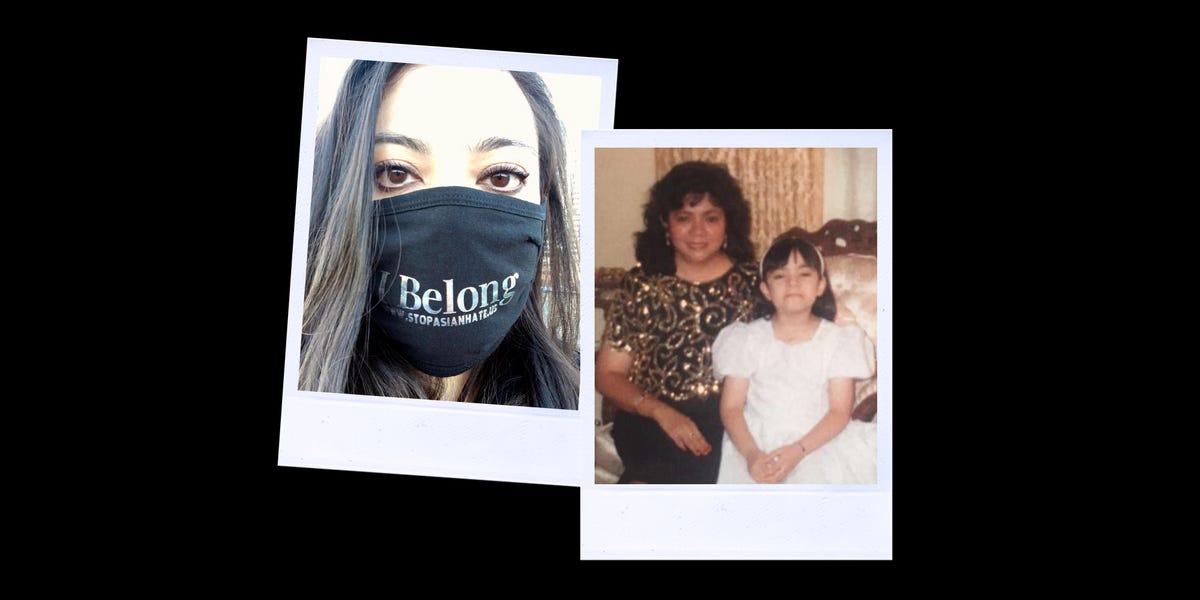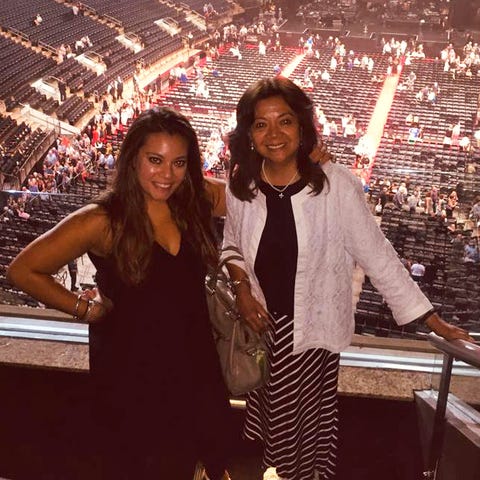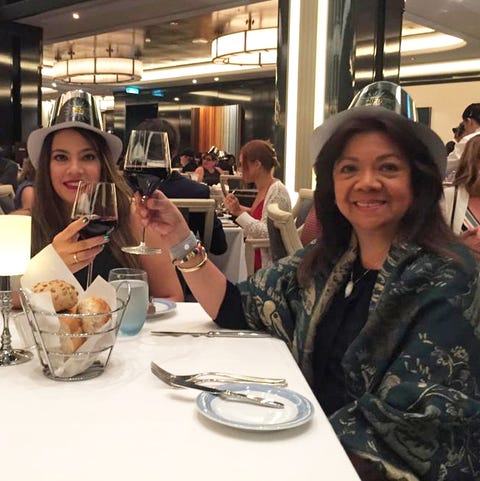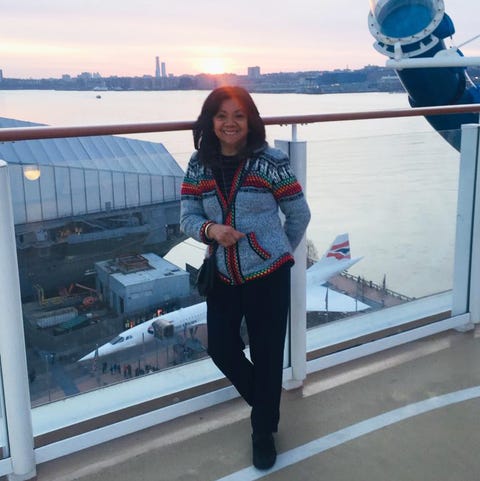On a chilly Monday morning in March, Vilma Kari, a 65-year-old mother of Filipino descent, bundled up in her brown leather jacket and headed to Holy Cross Church. But instead of going to mass, she was rushed to the hospital with a fractured pelvis. Security footage shows Kari being shoved to the ground just a few blocks away from the church. The assailant, a man who has since been identified and charged with a hate crime, stomped on Kari’s head three times, before leaving her crumpled body on the sidewalk.
The attack, just one in a string of senseless anti-Asian hate crimes since the start of the pandemic, drew widespread condemnation of three men who appear to watch from the lobby of a nearby luxury apartment complex. Not one of them stepped in to help, and when Kari struggled to stand up, one of the men, a security guard, shut the door to the building. Below, Kari’s daughter Elizabeth, who started a GoFundMe and healing collective in honor of her mother, opens up to ELLE about their family’s ongoing recovery—and why she no longer has the emotional energy to be “angry or sad.”
“F— you, you don’t belong here, you Asian.” Those are the last words my mom heard before a man brutally attacked her on the way to church.
“Are you sure he said that?” I asked. We were in the hospital just a few hours later, and her normally flawless face was speckled with bruises. “Yes,” she told me with certainty. “You don’t forget something like that.”
The seven days between Palm Sunday and Easter Sunday are called “Holy Week” in Catholicism, and they are very sacred. For my devout Filipino mother, this year’s Holy Week was especially important: It marked the 500th anniversary of the arrival of Christianity in the Philippines. She was walking to a Holy Week mass in New York City when the assault happened.
What mom survived was a cruel and random act of anti-Asian violence that, unfortunately, is all too common in this country right now. She could have been grabbing coffee or heading to the grocery store, she just happened to be going to church. And it could have been anyone—well, anyone Asian—she just happened to be in the wrong place at the wrong time.
Back at the hospital, she asked: “What did I do wrong?”
Before the attack, I had never seen mom in a hospital bed. She was always my caretaker, pushing me to succeed in all aspects of life. When I got a 98 on a test, she’d say, “What did you get wrong?” I think her mindset was that of an immigrant wanting to provide as many opportunities for her kid as she could. Mom grew up in the Filipino province of Camarines Norte, where her father was the governor. In her mid-20s, she came to the U.S. to work at the Philippine Consulate in Chicago. That’s where she met and fell in love with my dad.
Ours was a typical Midwestern family. We lived in the suburbs and, in traditional Filipino fashion, sang karaoke on weekends. I preferred Disney songs, and mom opted for The Beatles. Of course, you can’t talk about a Filipino upbringing without mentioning food. As a kid, I sat at the kitchen counter and watched mom fry stacks and stacks of lumpia filled with seasoned ground beef, peas, and carrots. She froze batches for parties, and served them with sweet and sour sauce. They were always the first to go.
When my dad passed away in 2012, mom was pretty much on her own. I had moved to New York City for college, and landed a job in fashion. A few months into the pandemic, we decided she would visit for a few weeks, before flying to the Philippines to see her siblings. Unfortunately, the country has been much slower with vaccine rollout, and she ended up moving semi-permanently into the apartment I share with my Shih Tzu-Pomeranian mix Aristotle.
With all of us working from home, I worried it might be tight. But mom didn’t spend much time in the apartment. She was always out and about exploring the city. When she first told me about her plan to walk to church during Holy Week, I warned her to be careful. If I had known what would happen, I never would have let her go in the first place.
I didn’t see footage of the attack until after I got home from the hospital. I had cracked open a bottle of wine, and plopped down on the couch after what felt like the longest day of my life. A friend sent me the video, which was posted to Diet Prada’s Instagram page with the trigger warning: “Violence, racism, apathy.”
I watched it once. Then a second time. And a third. I had heard mom’s firsthand account in the hospital, but this—this was not what I envisioned. It felt like all the oxygen had been sucked from the room. I calmed myself down by repeating: “You just spent the whole day with her, she’s okay.”
When her name was printed in The New York Times one day later, our entire world came crashing down around us for a second time. Until then, we hadn’t told anyone. There’s a certain stigma in Filipino culture that comes with being a victim. You spend your entire life striving to fit in, work hard, and bring respect to the family.
Anything that draws negative attention—even if it’s not your fault—is frowned upon. Mom insisted we keep everything under wraps, especially from her family overseas. I disagreed. I felt that if we talked about acts of hate against Asian communities, we might be able to help other survivors realize they are not alone.
Once mom started hearing from her Filipino relatives, who were all genuinely concerned, she began to understand why going public with what happened mattered. She feels so sad for people who don’t have the same kind of support system, and she wanted to do something to help.
Inspired by the hundreds of messages of prayers and love we received on GoFundMe, mom and I started a project called AAP(I Belong) to encourage open dialogue about anti-Asian hatred, and to shed the stigma that comes with being a victim of targeted hate. We are now accepting story submissions on our website, some of which will also be displayed in a pop-up gallery in honor of May’s AAPI Heritage Awareness month starting this Saturday at the Museum of Chinese in America in New York City.
This content is imported from Instagram. You may be able to find the same content in another format, or you may be able to find more information, at their web site.
There’s a long road to recovery ahead of us, but the many decent people who have reached out in the aftermath of the attack give us hope for a better future. What you don’t see in the viral video of the incident is the one good Samaritan who actually stood up for her. We don’t know who it is because their identity is part of an ongoing investigation, but mom and I are both thankful for them. I can’t be sad or angry knowing humanity isn’t all bad.
This interview has been lightly edited and condensed for clarity.
This content is created and maintained by a third party, and imported onto this page to help users provide their email addresses. You may be able to find more information about this and similar content at piano.io




